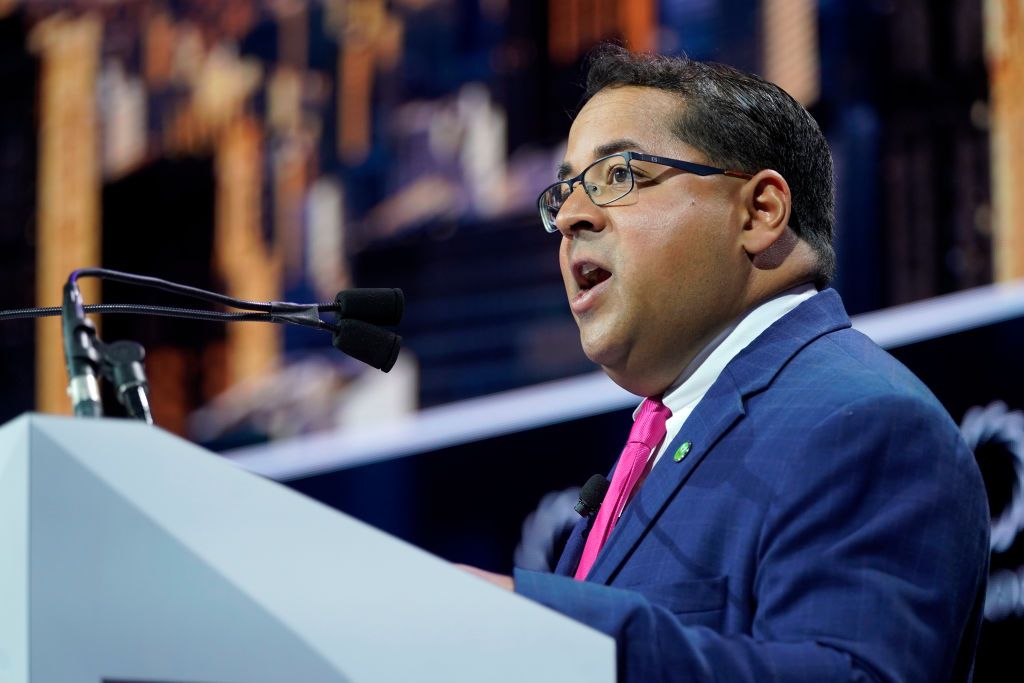CarbonCapture Inc. on Wednesday announced the appointment of Neil Chatterjee to its board of directors — sparking fresh criticism of technology to capture and store carbon dioxide, the former U.S. regulator, and the revolving door between government and industry.
Chatterjee was appointed to the Federal Energy Regulatory Commission in 2017 by then-President Donald Trump, now the presumptive Republican presidential nominee. Chatterjee served as FERC’s chair twice before his term expired in 2021. Prior to joining the commission, he advised U.S. Senate Minority Leader Mitch McConnell (R-Ky.) on energy.
“After greenlighting oil and gas expansion at FERC, Chatterjee is now capitalizing off of attempts to undo those harms,” Hannah Story Brown, a senior researcher in climate and governance at the Revolving Door Project, told Common Dreams. “It would have been far less costly to the public interest and the public purse if Chatterjee had helped stanch the flow of carbon pollution into our atmosphere when he was in the position to.”
Food & Water Watch policy director Jim Walsh said that “the so-called ‘carbon capture’ industry relies on billions of dollars in giveaways from the federal government, so it should not be a surprise that a company like this would add a Beltway insider to its board of directors.”
CarbonCapture Inc.’s statement on Chatterjee celebrates his “deep ties in Washington and across the industry,” saying that “in his time on Capitol Hill and at FERC, he established a reputation as a bipartisan operator who built alliances and cut through red tape.”
The company’s CEO, Adrian Corless, said that Chatterjee’s “deep understanding of the energy landscape in the U.S. and abroad will be incredibly important as we source large amounts of clean energy in the face of grid expansion challenges and bottlenecks.”
The firm builds “deeply modular” direct air capture (DAC) machines, which “use solid sorbents that soak up atmospheric CO2 when cooled and release concentrated CO2 when heated,” as its website details. “The captured CO2 can then be permanently stored underground or used to make synthetic fuels, low-carbon concrete, carbon black, or other industrial products that require clean CO2.”
Stressing the need to “decarbonize the atmosphere as quickly as possible,” Chatterjee said Wednesday that “CarbonCapture’s groundbreaking, modular direct air capture machines have put our country on the fast track to scale a proven solution at the speed and cost necessary to make a meaningful impact.”
Food & Water Watch agrees that the warming world requires swift and sweeping action on planet-heating pollution. Along with advocating for a rapid and just global phaseout of fossil fuels, the group prioritizes “calling foul on fake solutions” to the climate emergency.
“The fossil fuel industries are eager to tout carbon waste sequestration and direct air capture because they bolster the dominance of dirty energy sources like oil and gas,” Walsh told Common Dreams. “This is why they are called ‘false solutions’ — they delay the necessary actions to get off fossil fuels.”
Citing an International Energy Agency analyst in an article about the “major hurdles” that remain as DAC ramps up, Yale Environment 360 reported last week that “about three-quarters of all globally captured CO2 (which comes mainly from industrial flue stacks) is currently being used for enhanced oil recovery,” which involves injecting CO2 into wells to bury it and extract more oil.
As a pair of Walsh’s colleagues detailed for Food & Water Watch’s website last year, other issues with DAC include the technology’s high energy needs, toxic solvents, and risky storage options.
“Carbon capture has a long history of failure in the real world, but these companies have had great success in securing billions in government handouts,” Walsh said. In terms of Chatterjee’s appointment, he added that “this move is intended to make sure policymakers continue to make bad bets on carbon capture ever working.”
As Story Brown pointed out, “Neil Chatterjee’s prototypical spin of the revolving door, moving from pro-industry regulator to regulated industry, comes with added irony.”
“As a regulator, he positioned himself as preferring market-based ‘solutions’ over government mandates, subsidies, and regulations,” she explained. “But all that skepticism apparently vanished when he joined the carbon capture business, whose only hope of profitability comes from government subsidies like those in the Inflation Reduction Act.”
Corless was among those who welcomed what Time called a “bonanza for the carbon capture industry” in the 2022 legislation. Shortly before President Joe Biden signed the bill, the CEO said that “it’s going to make it easy for us to raise the capital to build the project earlier and to build it faster.”
However, it’s not just the government that is bankrolling CarbonCapture Inc. and similar ventures, as Story Brown noted.
“Neil Chatterjee hasn’t left the lure of market magic behind,” she said. “His firm has pre-sold millions in carbon removal credits so that energy-guzzling firms from Amazon to Aramco can greenwash their operations.”
Press freedom is under attack
As Trump cracks down on political speech, independent media is increasingly necessary.
Truthout produces reporting you won’t see in the mainstream: journalism from the frontlines of global conflict, interviews with grassroots movement leaders, high-quality legal analysis and more.
Our work is possible thanks to reader support. Help Truthout catalyze change and social justice — make a tax-deductible monthly or one-time donation today.
